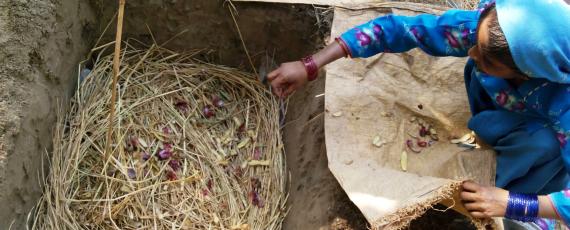From “Why?” to “Let’s Work!” on Kitchen Gardens

Action Against Hunger is carrying out a study in Pakistan on ‘Peoples’ perspective and feasibility of kitchen gardening in different geographical and environmental contexts’ funded under the Leveraging Agriculture for Nutrition in South Asia’s second Responsive Window grant.
About the study
In Pakistan, figures indicate that intake of vitamin-rich foods is a challenge for many people. Therefore diets are inadequate in terms of nutrient consumption, which eventually leads to undernutrition contributing to the decline of cognitive skills in the long run.
This study focuses on three districts of Sindh Province - including Village Jarro Panhwar of Tehsil Hosri in District Hyderabad, Village Badin of Union Council Tarai in District Badin, and Village Fateh Brohi of Union Council Johi in District Dadu. The villages have distinct geographic and environmental contexts - Dadu District is affected by drought, Badin is a flood-prone area, and Hyderabad is a peri-urban setting.
To understand barriers and boosters of kitchen gardening and to explore people’s perspectives on the feasibility of this activity, nine community researchers (CRs) were selected from the above-mentioned communities to receive kitchen gardening toolkits, also an adequate quantity and variety of seeds. In addition, Action Against Hunger’s Agronomy Officer conducted a comprehensive training with the CRs on how to prepare the land using natural methods. The CRs receive a monthly stipend for their time.
Initial reactions to the new intervention
The pre-KAP survey results indicated that the village women had very little knowledge about working in kitchen gardens. Initially, even their husbands were reluctant and hesitated giving the women permission to be involved in gardening. The trainings helped build confidence among the women, and once they understood how kitchen gardens can help contribute to a better and varied diet, the women showed more interest in the intervention.
Finally, nine CRs were selected with the consent of the village community and in agreement with households. This was done based on specific criteria that included looking at the financial status of the family, access to land, the ability to use technology (especially smartphones for data collection), etc.
Till date, the CRs have not just succeeded in kitchen gardening, but have also shown a high level of dedication and interest in the project. The women plant the seeds and care for the plants diligently. Their husbands are also supportive and help them with fixing-up a well-organised garden near their house.
Follow-up and continued support to ensure sustainability
Action Against Hunger’s project team maintain continuous interaction with CRs and their families to guide them in further upgrading their gardens. Coordination has helped the CRs build stronger relationships with other household members as well. It is also observed that family members are now keen to extend their support to the CRs.

The women had sowed seeds for the Kharif season and once the kitchen gardens begin producing vegetables, their productivity will be measured along with the inputs and the consumption of vegetables produced. Key activities of this research project so far have included formative research, pre- and post-KAP surveys and regular data collection, as well as strengthening capacity for the women.
The findings of this study have implications for the body of evidence on kitchen gardening, and specifically the impact of kitchen gardening on undernutrition and household food security.








Add new comment